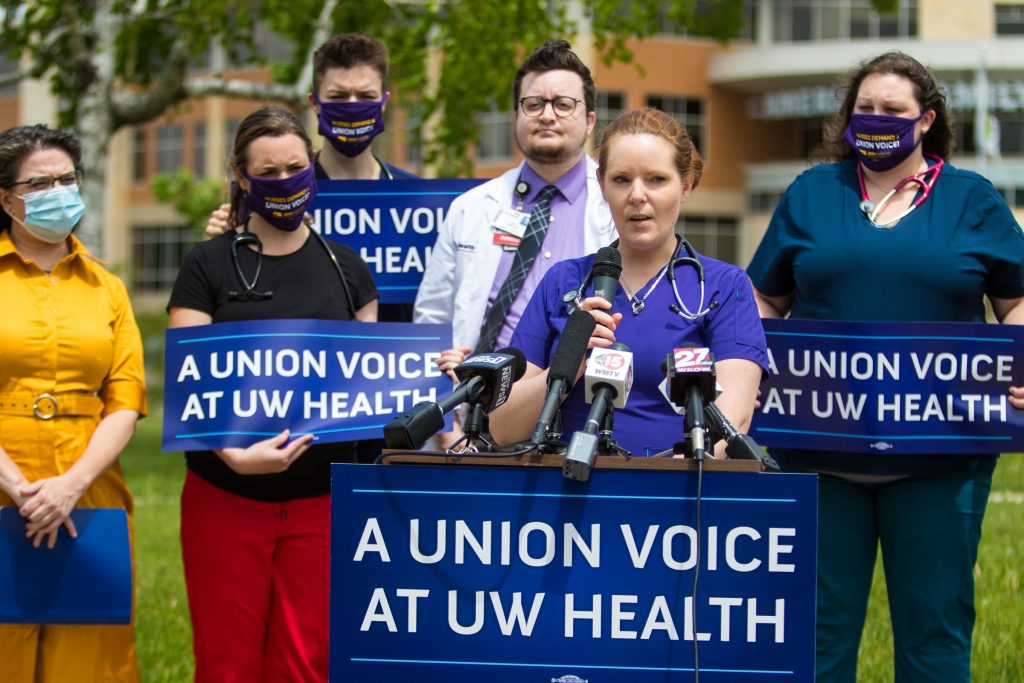Despite Act 10, Union Argues UW Health Nurses Can Collectively Bargain
Supreme Court oral arguments come as larger case about Act 10 is pending.

Registered nurse Tami Burns speaks during a May 2021 press conference calling on UW Health to recognize a nurses’ union. Around 2,500 nurses lost certification of their union in 2014 when their contract expired. Since then, UW Health has argued that Act 10 precludes the quasi-state health authority from signing a collective bargaining agreement with its workforce. Photo courtesy of SEIU Healthcare Wisconsin
A union representing nurses in Madison is asking the Wisconsin Supreme Court to require UW Health to collectively bargain despite Act 10 stripping those rights from most public employees in 2011.
The lawsuit before the court was filed by Service International Employees Union, or SEIU, and stems from a 2022 agreement with the University of Wisconsin Hospitals and Clinics Authority, or UWHCA, to avoid a strike. The union was phased out in 2014 following the the passage of Act 10 under former Republican Gov. Scott Walker, but UW Health nurses revived it in 2019 and demanded it be recognized by the UW authority.
In 2022, the Wisconsin Employee Relations Commission declared the Employment Peace Act does not apply to UWHCA.
Packard told justices that unless the meaning of the statute is unclear, justices “may stop there” without reviewing subsequent statutory history, including Act 10.
Conservative Justices Brian Hagedorn and Rebecca Bradley took issue with the suggestion. Bradley asked whether Packard was asking the court to ignore Act 10, which explicitly eliminated collective bargaining for UWHCA employees.
Packard said the court can review the 2011 law if it wants. But she said the text of the peace act shows lawmakers also made a choice not to exempt the UWHCA .
“In the peace act … there is a whole section of exceptions from the definition of employer,” Packard said. “The Legislature could have included the hospital authority in that list of exceptions, and it did not.”
“I mean, you represented in federal court that the statute had exactly the effect you’re saying right now it does not,” Hagedorn said.
In her response, Packard said SEIU is making a different argument now that focuses on statutory interpretation, not constitutional rights.
UW Health attorney says union’s argument not based in reality
Attorney James Goldschmidt, who is representing the UW Health and Clinics Authority, said the union’s argument isn’t based in reality. Moreover, he said justices would have to overturn past cases if they sided with SEIU, which would create an “absurd result that the Legislature somehow failed to do what it told everyone quite loudly and clearly it was doing in Act 10.”
“And there is an element of all this that, I must confess, feels a little bit like ‘The Emperor’s New Clothes,’ where everyone has a firm grasp on reality, until a new tailor comes to town and says, ‘I’m going to make you a garment that only the most sophisticated people can see,’” Goldschmidt said. “And now, we’re presented with this interpretation of what happened in Act 10, that everyone knows is not what happened, and we’re asked to accept that as reality.”
Goldschmidt said an attorney might get it wrong, “but this court holds itself to a high standard and it explains very clearly that when you set out to interpret a statute, you don’t just look at the words on a page.”
Bradley appeared unsatisfied and said statutes aren’t just for the courts or the Legislature and said she’s concerned only “one of those of the selected few really know what all of these numbers and digits mean.”
A broader lawsuit challenging Act 10 is still working its way through the state court system. Hours after Wednesday’s oral arguments, the Supreme Court announced it would not hear that case before a state appeals court has ruled.
Union tells Supreme Court that UW Health can collectively bargain despite Act 10 was originally published by Wisconsin Public Radio.
If you think stories like this are important, become a member of Urban Milwaukee and help support real, independent journalism. Plus you get some cool added benefits.
More about the ACT 10
- Susan Crawford Attempted to Overturn Act 10 - Brad Schimel - Feb 26th, 2025
- Despite Act 10, Union Argues UW Health Nurses Can Collectively Bargain - Rich Kremer - Feb 13th, 2025
- Protasiewicz Says She Won’t Recuse From Act 10 Case - Anya van Wagtendonk - Feb 13th, 2025
- Unions: We Remain Confident in Merits of Our Case - Wisconsin Education Association Council - Feb 12th, 2025
- Supreme Court Justice Brian Hagedorn Recuses Himself From Act 10 Challenge - Rich Kremer - Jan 31st, 2025
- Republicans Push Justice Protasiewicz to Recuse From Act 10 Case - Anya van Wagtendonk - Jan 29th, 2025
- Ruling That Struck Down Act 10 Put on Hold - Rich Kremer - Dec 20th, 2024
- Data Wonk: Did Act 10 Improve Wisconsin’s Economy? - Bruce Thompson - Dec 12th, 2024
- Op Ed: Republicans Behind the Times on Act 10 - Ruth Conniff - Dec 11th, 2024
- Murphy’s Law: Act 10 Ruling Could Be Tough to Overturn - Bruce Murphy - Dec 9th, 2024
Read more about ACT 10 here





















